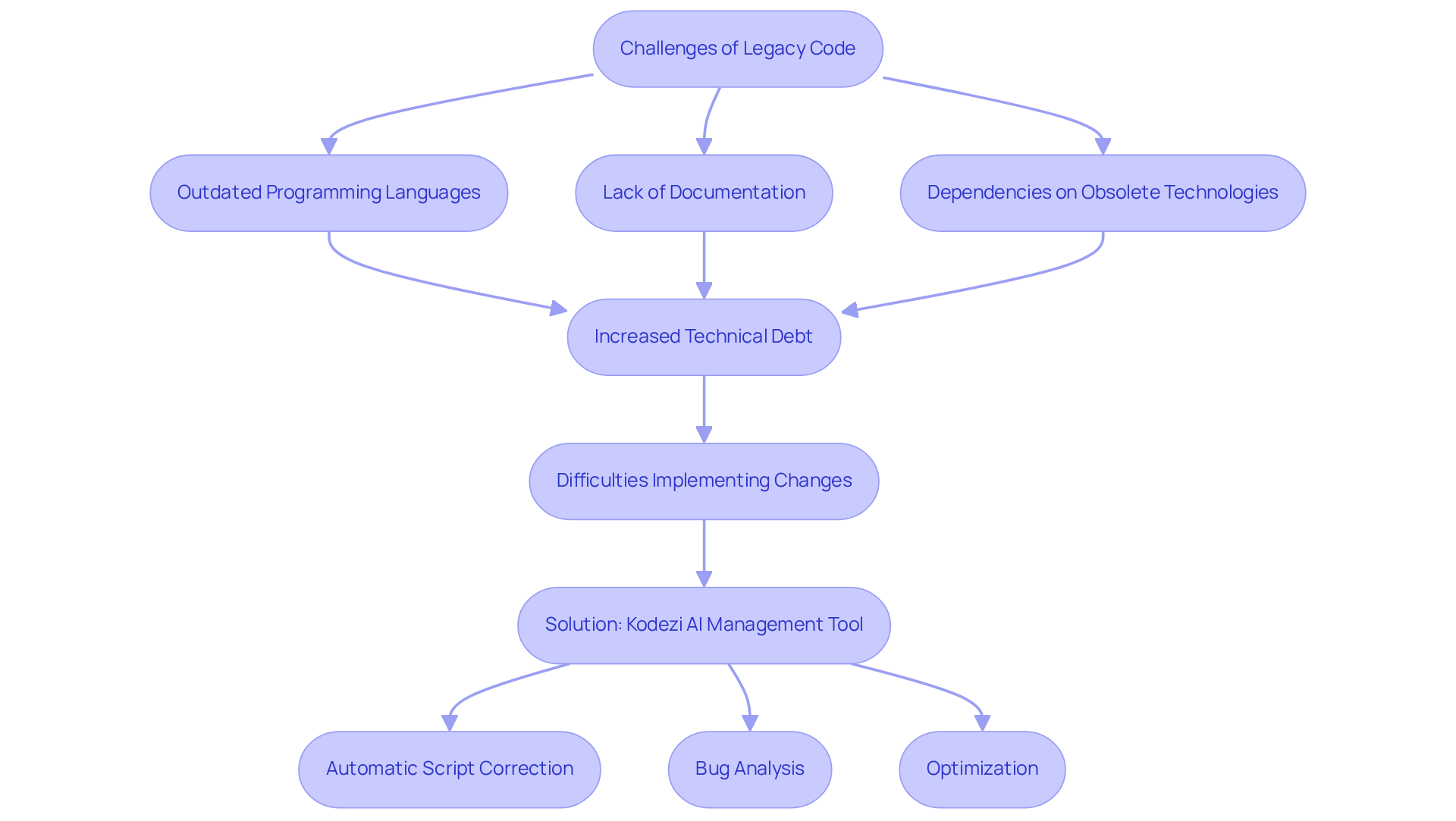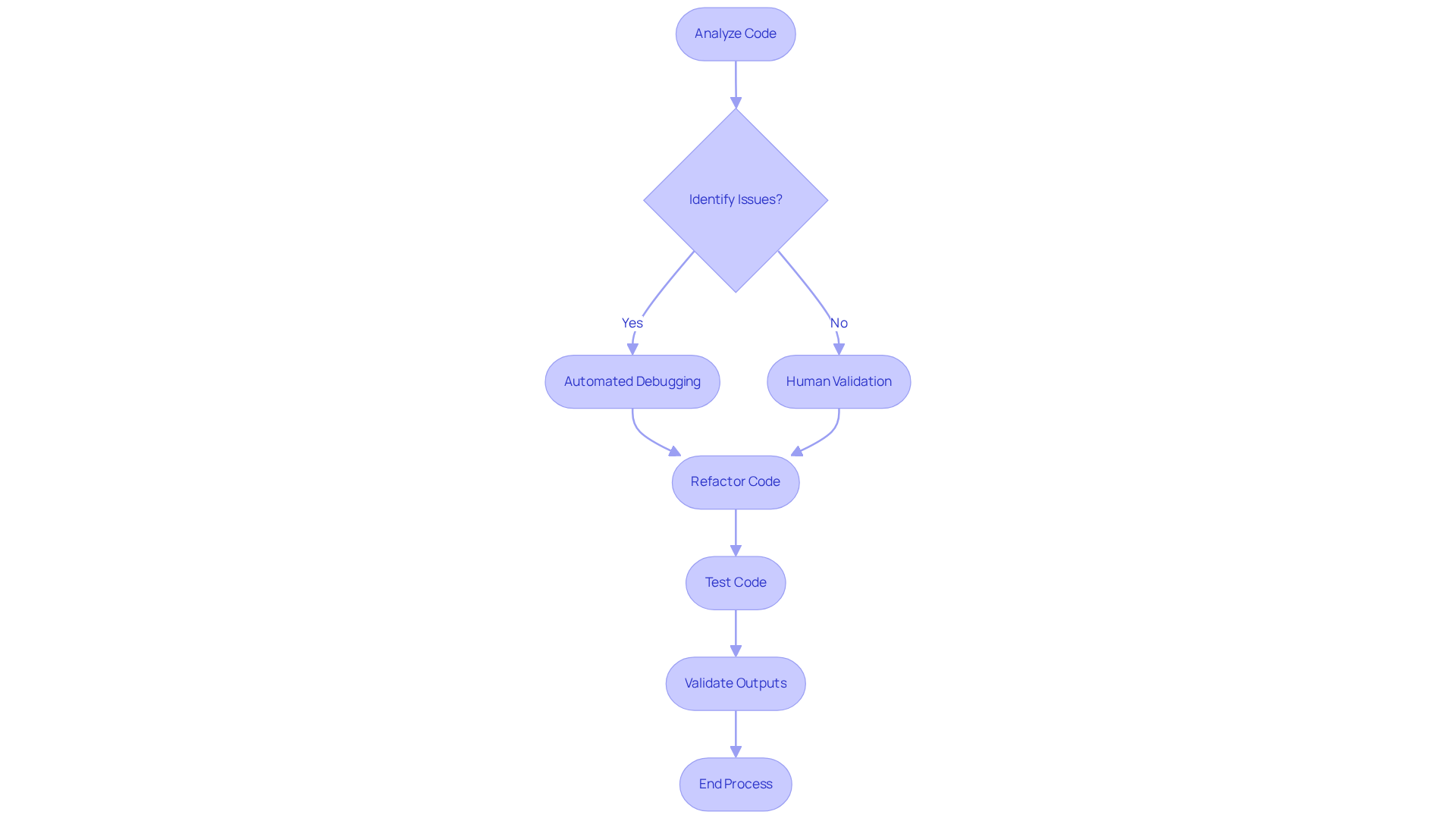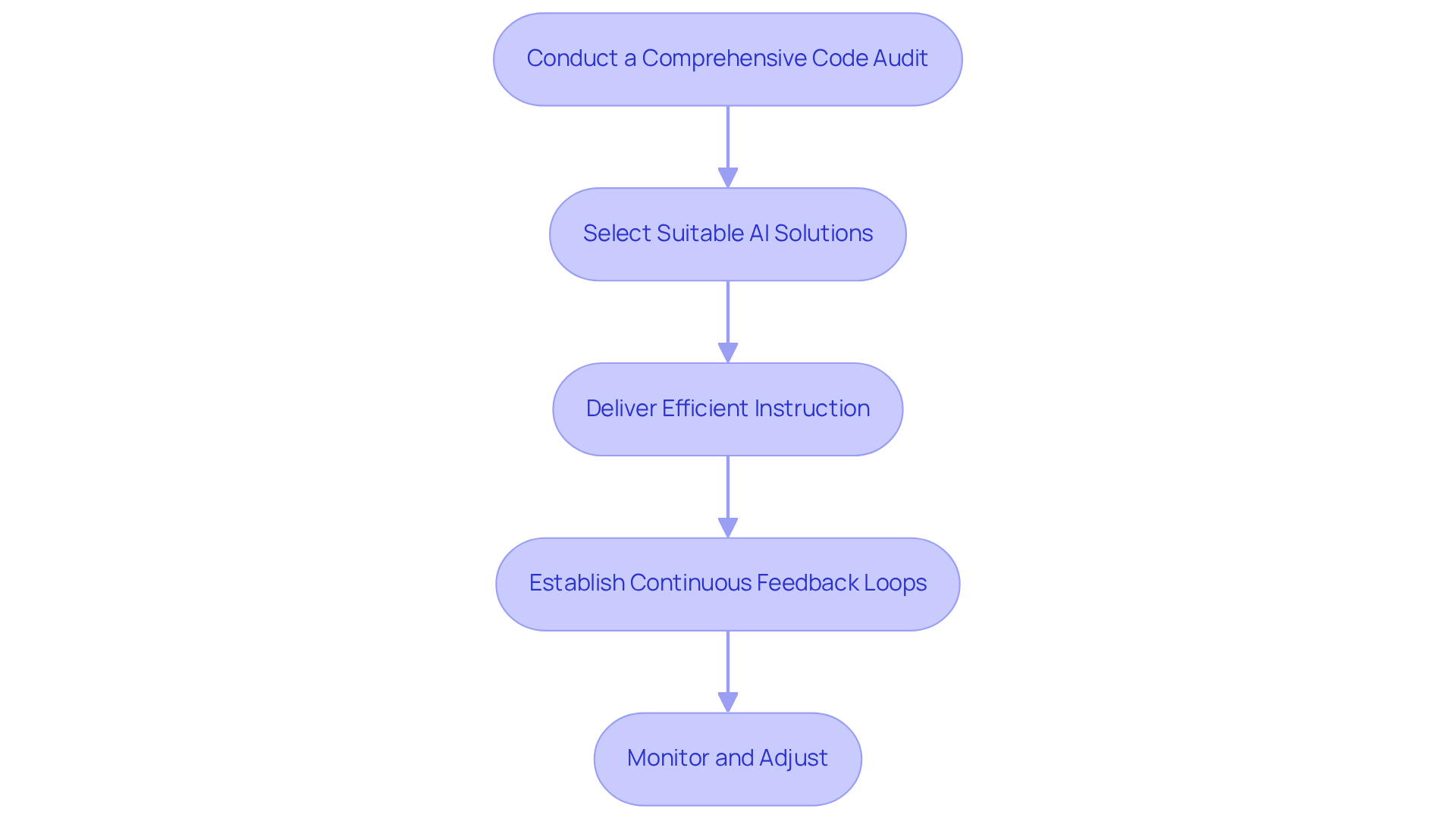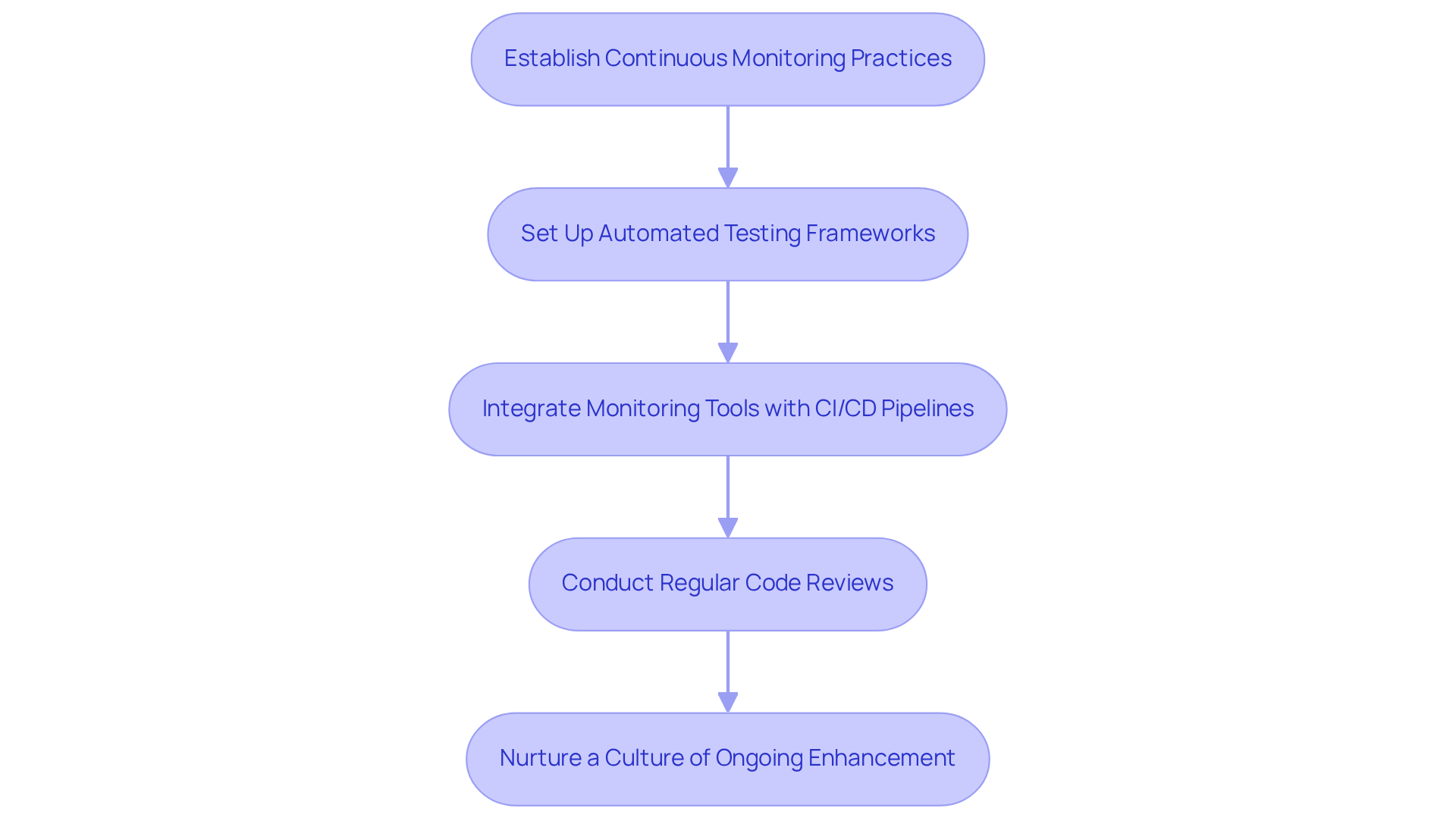Overview
Managing AI legacy code presents significant challenges for developers. Understanding these challenges is crucial for effective modernization. Kodezi offers innovative tools that automate processes like bug fixing and code analysis, addressing these pain points directly.
By leveraging Kodezi, developers can enhance efficiency and reduce technical debt in legacy systems. The platform's automation capabilities not only streamline workflows but also improve overall productivity. Imagine spending less time on tedious debugging and more time on innovation.
Furthermore, Kodezi's best practices ensure that your code remains clean and maintainable. Continuous monitoring is a key feature that helps identify issues before they escalate, promoting a proactive approach to code management. Are you ready to elevate your coding practices?
In addition to these features, Kodezi provides valuable insights into code quality, empowering developers to make informed decisions. The benefits of using Kodezi are clear: improved productivity, reduced technical debt, and enhanced code quality. Explore the tools available on Kodezi's platform and transform your approach to legacy code management today.
Introduction
Legacy code presents significant challenges for developers, especially in the context of AI integration. Outdated programming languages, insufficient documentation, and a reliance on obsolete technologies create a tangled web of technical debt that can hinder progress. Furthermore, how can organizations effectively navigate this complex landscape? This article explores five strategic approaches to managing AI legacy code, offering insights into how teams can utilize advanced tools and best practices to modernize their systems. By addressing these challenges head-on, Kodezi provides specific features designed to streamline the integration process and improve overall productivity.
Understand Legacy Code: Challenges and Characteristics
Developers often face a myriad of challenges with legacy software, particularly in the realm of AI legacy code management. Outdated programming languages, lack of documentation, and dependencies on obsolete technologies contribute to heightened technical debt in the context of AI legacy code management. This complicates the ability of teams to implement changes without introducing new bugs. Have you ever faced difficulties in understanding legacy code? Characteristics of such code include poor readability, lack of modularity, and insufficient testing coverage. Comprehending these challenges is crucial for groups aiming to effectively manage their AI legacy code management.
Fortunately, Kodezi addresses these challenges with its AI legacy code management development tool. It offers features like:
- Automatic script correction
- Bug analysis
- Optimization
By recognizing these problems early, teams can prioritize areas for enhancement and utilize AI legacy code management to automate remediation processes. Imagine the efficiency gains when you can streamline your coding practices with such tools.
The benefits of using Kodezi are significant. It not only results in a more maintainable system but also ensures privacy protection for all programs and data. This makes it an invaluable resource for programmers of all levels. Explore the tools available on the Kodezi platform and see how they can transform your coding experience.

Leverage AI for Effective Legacy Code Modernization
Coding challenges can be daunting for developers, particularly when it comes to modernizing legacy software. AI is revolutionizing this landscape by automating essential processes such as analysis, refactoring, and testing. Kodezi addresses these challenges with tools that independently recognize programming issues, suggest improvements, and even modify code segments to align with modern standards.
The platform's features, including automated debugging, bug fixing, test correction, and documentation alignment, ensure that current scripts remain operational and compliant. This integration of AI significantly reduces manual effort, minimizes human errors, and accelerates the transition to sustainable programming. For instance, Kodezi's ability to swiftly identify and resolve codebase problems empowers teams to address performance bottlenecks and security vulnerabilities promptly, ultimately enhancing overall code quality.
Moreover, AI-driven solutions can analyze historical software changes to uncover patterns and recommend optimal refactoring strategies. This ensures that modernization efforts are both effective and efficient. Research indicates that teams utilizing AI legacy code management for program analysis and restructuring can experience a productivity increase of 2-3 times, highlighting the importance of these advanced tools in managing legacy systems.
Furthermore, incorporating a 'human in the loop' process is crucial for validating AI-generated outputs, fostering trust in these innovative solutions. Explore the tools available on Kodezi's platform to experience these transformative benefits firsthand.

Implement Best Practices for AI Integration in Legacy Code Management
Integrating AI legacy code management can be challenging for developers. However, by implementing best practices, teams can navigate these challenges effectively.
-
Conduct a Comprehensive Code Audit: Start by performing a thorough code audit to identify areas where AI can provide significant value. This initial step is crucial, as it helps recognize inefficiencies and potential enhancements that AI legacy code management can effectively address. For example, organizations that conduct comprehensive audits often discover that annual maintenance costs can reach 15-20% of the initial investment, underscoring the importance of pinpointing areas for improvement.
-
Select Suitable AI Solutions: Choose AI solutions that seamlessly fit into your team's existing workflows and technologies. Kodezi CLI, for instance, serves as a versatile resource, enabling teams to automatically repair codebases and enhance programming efficiency. Ensuring compatibility minimizes disruption and increases the likelihood of successful integration.
-
Deliver Efficient Instruction: Equip your team members with the knowledge to utilize AI resources effectively. Training should encompass both the capabilities and limitations of the technology, fostering a deeper understanding of how to leverage AI in daily tasks. Research indicates that effective training can significantly boost the adoption of AI tools among teams. Many users have reported that the tool has notably improved their debugging efficiency, simplifying the process of resolving issues and bugs.
-
Establish Continuous Feedback Loops: Create mechanisms for ongoing feedback to refine AI recommendations based on team input and outcomes. This iterative process facilitates adjustments that enhance the effectiveness of AI interventions. For instance, organizations that have implemented feedback loops often report improved AI performance and user satisfaction as a result of effective AI legacy code management. Testimonials from Kodezi users highlight how the tool has empowered developers, allowing them to focus on higher-level tasks.
-
Monitor and Adjust: Regularly evaluate the impact of AI on code quality and team productivity. Tracking these metrics enables teams to make informed modifications to their strategies, improving outcomes and ensuring that AI integration aligns with overall project objectives. It’s essential to be aware of common pitfalls, such as hastily proceeding without adequate planning, which can lead to ineffective implementations. By utilizing resources like coding platforms, teams can enhance their programming capabilities and boost overall efficiency.

Ensure Continuous Monitoring and Maintenance of Legacy Code
To guarantee the long-term success of AI legacy code management, teams must establish continuous monitoring practices. Developers often face significant coding challenges, such as managing technical debt and ensuring code quality with AI legacy code management. How can these issues be effectively addressed? One solution lies in implementing robust monitoring strategies.
Setting up automated testing frameworks that run regularly is essential to catch issues early. Furthermore, employing resources like Kodezi CLI provides real-time insights into program health, autonomously enhancing quality by resolving issues before they reach production. In addition, establishing a routine for code reviews and refactoring is crucial for maintaining code integrity.
Integrating monitoring tools with CI/CD pipelines is essential for AI legacy code management, as it allows teams to swiftly detect and address issues as they arise, preventing the accumulation of technical debt. By nurturing a culture of ongoing enhancement and utilizing CLI's features, teams can achieve AI legacy code management while upholding a tidy, compliant, and production-ready codebase. Imagine the productivity gains and reduced risk of critical failures that come from such proactive measures.
For those interested in getting started, Kodezi offers a 5-minute quickstart guide and the opportunity to see a demo. Explore the tools available on the platform to enhance your overall productivity and ensure your code quality remains high.

Conclusion
Effective management of AI legacy code is crucial for preserving the integrity and performance of software systems. Developers often face unique challenges, such as outdated languages and insufficient documentation. How can teams overcome these hurdles? By leveraging advanced tools like Kodezi, they can streamline coding practices and enhance overall productivity. The integration of AI not only automates essential processes but also empowers developers to concentrate on more strategic tasks, thus propelling modernization efforts forward.
Several key strategies emerge for successful AI legacy code management:
- Conducting thorough code audits
- Selecting appropriate AI solutions
- Establishing continuous feedback loops
These strategies enable teams to identify inefficiencies, improve workflows, and uphold high standards of code quality. Furthermore, ongoing monitoring and maintenance play a critical role in safeguarding against the accumulation of technical debt, ensuring that systems remain compliant and operational.
In conclusion, embracing AI in legacy code management is not merely a trend; it represents a vital step toward achieving sustainable software development. Organizations are encouraged to explore the tools and strategies discussed, as they can significantly enhance coding efficiency and mitigate risks associated with legacy systems. By prioritizing these practices, teams can transform their approach to legacy code, fostering a culture of continuous improvement and innovation that will benefit them well into the future.
Frequently Asked Questions
What challenges do developers face with legacy software?
Developers face challenges such as outdated programming languages, lack of documentation, and dependencies on obsolete technologies, which contribute to heightened technical debt in AI legacy code management.
What are the characteristics of legacy code?
Characteristics of legacy code include poor readability, lack of modularity, and insufficient testing coverage.
Why is it important to understand the challenges of legacy code?
Understanding these challenges is crucial for teams aiming to effectively manage their AI legacy code management and implement changes without introducing new bugs.
How does Kodezi help with AI legacy code management?
Kodezi addresses challenges in AI legacy code management by offering features such as automatic script correction, bug analysis, and optimization.
What are the benefits of using Kodezi for legacy code management?
The benefits of using Kodezi include a more maintainable system, enhanced privacy protection for programs and data, and improved efficiency in coding practices.
Who can benefit from using Kodezi?
Kodezi is an invaluable resource for programmers of all levels, helping them streamline their coding experience.




